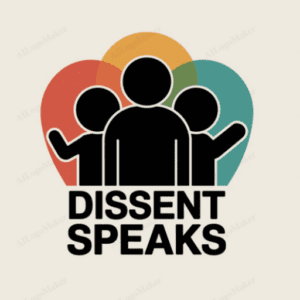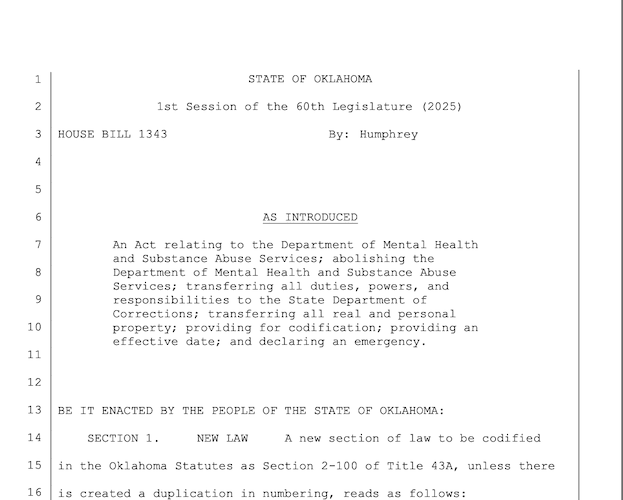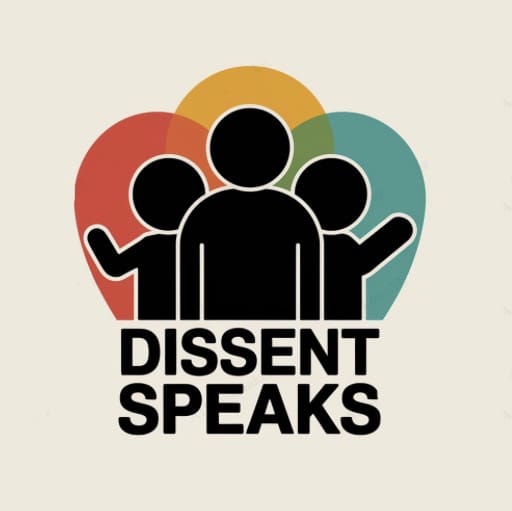In a move that signals a dramatic shift in how Oklahoma approaches mental health care, House Bill 1343, introduced by Representative Justin Humphrey, proposes to completely dissolve the Department of Mental Health and Substance Abuse Services (ODMHSAS) and transfer all its functions to the Department of Corrections. This legislation emerges at a critical time when Oklahoma’s mental health and criminal justice systems are already under significant strain.
The Concerning Language
The bill’s language is deceptively simple but carries profound implications. Section 1 states plainly: “The Department of Mental Health and Substance Abuse Services is hereby abolished.” This stark declaration represents more than administrative reorganization – it fundamentally reframes mental health care as a correctional issue rather than a healthcare concern.
The emergency clause in Section 3 is particularly troubling, as it would allow the bill to take effect immediately upon passage, potentially creating chaos in the transition of services. This urgency clause suggests a rushed implementation that could disrupt critical mental health services for vulnerable Oklahomans.
Broader Context and Timing
This proposal comes at a particularly sensitive moment. The provided research shows that ODMHSAS is currently embroiled in a federal lawsuit regarding the treatment of individuals deemed incompetent to stand trial. The timing of this bill appears to intersect with other significant developments:
- Senate Bill 811, sponsored by Julie Daniels, mandates ODMHSAS develop community-based competency restoration services
- Oklahoma County’s jail recently failed a surprise health inspection
- The state is grappling with overcrowded correctional facilities and insufficient mental health resources
Cultural Shift and Implications
This legislation represents a dramatic departure from the current nationwide trend toward de-stigmatizing mental health care and separating it from criminal justice. By placing mental health services under correctional control, the bill risks:
- Criminalizing Mental Health: Treatment would be administered through a punitive lens rather than a therapeutic one
- Reducing Access: People might avoid seeking help for fear of entering the correctional system
- Stigmatization: Mental health challenges would become further associated with criminality
- Resource Competition: Mental health funding could be redirected to general correctional needs
The GOP’s Human Rights Record
While supporters argue this consolidation could streamline services and reduce costs, the bill appears to prioritize administrative efficiency over human welfare. This comes as Oklahoma’s Republican-led legislature is simultaneously considering other controversial measures, including changes to the death penalty system and jail standards reform.
The juxtaposition is striking – while Senate Bill 601 proposes a moratorium on executions, suggesting some concern for human rights, HB 1343 potentially undermines the fundamental right to accessible mental health care. This mixed messaging raises questions about the consistency of the GOP’s approach to human dignity and rights.
Actionable Steps for Concerned Citizens
- Immediate Actions:
- Contact Oklahoma state legislators, particularly members of relevant health and criminal justice committees
- Organize or join advocacy groups focused on mental health rights
- Share personal stories about the importance of separate mental health services
- Legislative Engagement:
- Monitor the bill’s progress through committee hearings
- Attend public forums and legislative sessions
- Submit written testimony about the bill’s potential impacts
- Community Organization:
- Form coalitions with mental health advocacy groups
- Engage local medical professionals to speak about the importance of specialized mental health care
- Create awareness campaigns about the distinction between mental health care and criminal justice
- Long-term Advocacy:
- Support alternative legislation that strengthens mental health services
- Work with policy experts to develop better solutions for integrated care
- Document and share the outcomes of similar policies in other jurisdictions
A Matter of Public Health
The research provided reveals this bill exists within a broader context of Oklahoma’s struggling public health system. The proposed transfer of mental health services to corrections comes as the state faces:
- Ongoing challenges with jail conditions and oversight
- A backlog of competency cases in the criminal justice system
- Insufficient resources for community-based mental health care
By understanding these interconnected issues, we can better appreciate how HB 1343 could exacerbate existing problems rather than solve them.
This legislation represents a critical moment for Oklahoma’s approach to mental health care. The outcome could set precedents for other states and influence national conversations about the relationship between mental health and criminal justice. As this bill moves through the legislative process, engaged citizen action will be crucial in determining whether Oklahoma moves forward or backward in its treatment of mental health challenges.
The danger lies not just in the immediate effects of the bill, but in its potential to fundamentally reshape how society views and treats mental health issues for generations to come. The question before Oklahoma’s citizens and legislators is whether they want mental health care to be a matter of public health or criminal justice – a decision that will impact countless lives.


